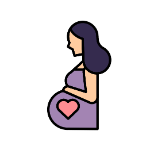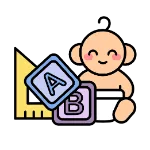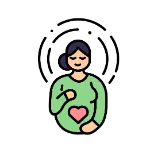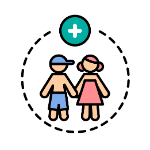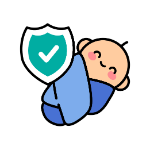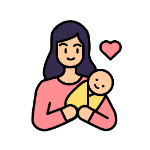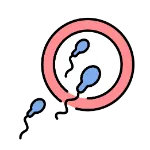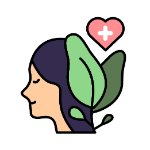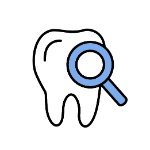
10 Early Signs Of Pregnancy
Are you concerned if you're expecting a baby? You could check for small signs and symptoms that indicate you're pregnant before taking a pregnancy test if you're trying to conceive. While a reliable test is the only way to know for sure if you're pregnant, these 10 early indicators of pregnancy usually appear within a week of conception.(Image credits to Canva)
#1. Spotting and cramping
The fertilized egg attaches itself to the uterine wall after conception. This can result in spotting and, in some cases, cramping, which are early indicators of pregnancy. This is referred to as implantation bleeding. It happens six to twelve days after the egg is fertilized.(Image credits to Canva)
As cramps and bleeding resemble menstrual cramps, some women mistake them for the start of their period. You may detect a white, milky discharge from your vaginal area in addition to bleeding. This is due to the thickening of the vaginal walls, which occurs shortly after pregnancy. The discharge is caused by the increased development of cells lining the vaginal canal.
This discharge, which might last the entire pregnancy, is usually harmless and does not necessitate treatment. However, if the discharge has a bad odor or a burning and itching feeling, consult your doctor to determine whether you have a yeast or bacterial infection.
#2. Changes in your breasts
Another early indicator of pregnancy is breast changes. Hormone levels in a woman's body fluctuate rapidly after conception. Their breasts may become puffy, painful, or tingling for a week or two as a result of the changes. They could also feel bigger, fuller, or delicate to the touch. The areola (the area around the nipples) may also darken.
Breast changes could be caused by a variety of factors. If the changes are an early sign of pregnancy, keep in mind that it will take several weeks for your body to adjust to the new hormone levels. When it occurs, though, breast tenderness should subside.
#3. Morning sickness
Morning sickness has a reputation for being misnamed. It can happen at any time, as most pregnant women will tell you. It's also a frequent pre-pregnancy symptom before you miss your period. Your body produces more estrogen and progesterone a few days after fertilization, causing nausea and vomiting.(Image credits to Canva)
Nausea and vomiting normally begin before the 9th week of pregnancy and may occur before your missing period, according to the American College of Obstetricians and Gynecologists (ACOG). Morning sickness normally goes away during the 14th week of pregnancy for most women, but it might last the entire pregnancy for others.
#4. Sensitivity to smells
You might notice that you're more sensitive to smell, in addition to changes in dietary preferences. Because your sense of smell might go into overdrive during pregnancy, the smell of certain things may become quite intense and unpleasant all of a sudden.(Image credits to Canva)
#5. Changes in urination & bowel movement
You might expect some differences from your typical restroom routine if you're pregnant in the early stages. Hormonal shifts are the source of this, and it may imply that you need to schedule more bathroom visits into your day.(Image credits to Canva)
You will most likely urinate more frequently than usual in the first trimester of pregnancy. This is an extremely common symptom. Other illnesses, such as diabetes and urinary tract infections, can cause similar symptoms. As a result, if you suspect that your frequent urination is caused by something other than pregnancy, you should seek medical advice.
#6. Mood swings
There are many things that might affect your mood, from a difficult day at work to the natural wonders of your menstrual cycle. However, mood swings are common during pregnancy, and they can be most obvious early on when your body experiences a surge of estrogen and progesterone.
If you're pregnant, any mood swings are likely to be accompanied by other symptoms like exhaustion or nausea. You can become more sensitive or tearful. Perhaps you have a shorter fuse and are more easily irritated.
#7. Fatigue
Taking care of a growing fetus might drain you of all your energy. Even in the early stages of pregnancy, feeling tired is usual. Your body is working tirelessly to increase your blood supply. During the first trimester, low blood sugar and blood pressure are also frequent. When you combine those circumstances with the hormonal changes that come with pregnancy, you may find yourself exhausted. Fortunately, many women discover that by the second trimester, they have regained their strength and stamina.(Image credits to Canva)
#8. Missed period
A missed menstruation is the most visible early symptom of pregnancy and the one that causes most women to take a pregnancy test. Pregnancy does not, however, cause all missed or delayed periods.
During pregnancy, women may also suffer some bleeding. If you're pregnant, talk to your doctor about what to expect when it comes to bleeding. When is bleeding normal and when is it a symptom of an emergency, for example?
Aside from pregnancy, there are other causes for missing a period. It's possible you've gained or lost too much weight. Other factors to consider include hormonal imbalances, weariness, and stress. When they stop using birth control pills, some women skip their periods. If your menstruation is late and you think you could be pregnant, you should get a pregnancy test.
#9. Food cravings
Strange food cravings are a common trope in television and film depictions of pregnant women. That stereotype, on the other hand, is based on reality. A few weeks after conception, many pregnant women exhibit food cravings or aversions. You may find yourself craving foods you don't normally eat. You can become sick after eating your favorite dishes. You could also lose your appetite completely.(Image credits to Canva)
#10. Dizziness
Blood pressure can drop when blood flow increases during pregnancy, resulting in dizzy episodes. Dizziness is more frequent in the second trimester, but some women may experience it earlier in the pregnancy.(Image credits to Canva)
So, did you find 10 early signs of pregnancy by HappyPreggie helpful?
Everyone's pregnancy is unique, and every pregnancy is distinct - even within the same person. Early on in pregnancy, your body will undergo substantial changes. You might notice symptoms like nausea, breast pain, and, of course, the dreaded missed period.
A home pregnancy test is an excellent first step if you suspect you might be pregnant. These tests are generally available at pharmacies and other retailers without a prescription. Make an appointment with a doctor as soon as possible following conception. This could help you have a healthy pregnancy.
If you want to read more of our article, here are some suggestions- Make Potty Training Your Child Easier By Following These 12 Easy Tips and Baby Basic 101: How To Burp Your Baby.
